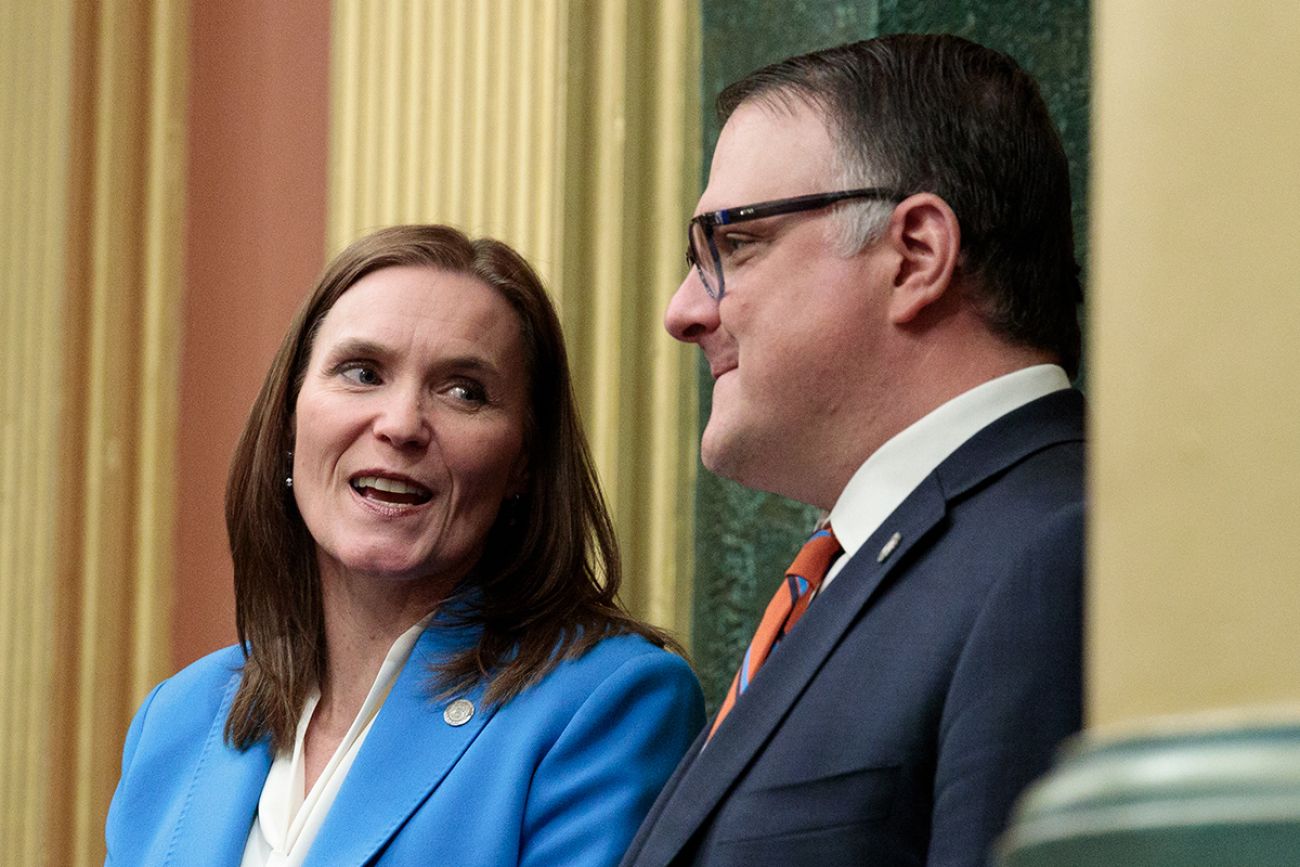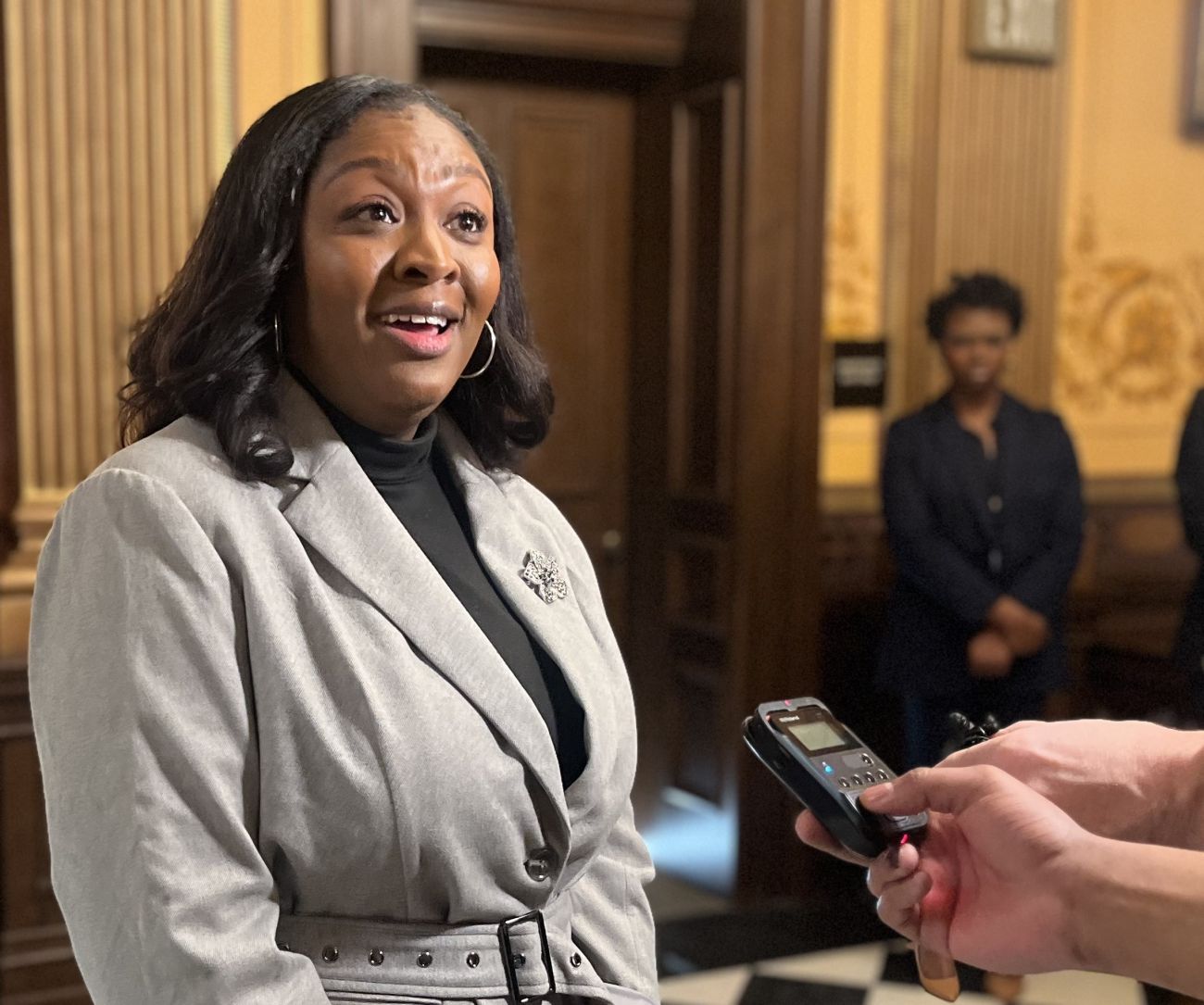Two laws in 90 days: Michigan’s new divided Legislature off to slow start

- Nearly 90 days into the new session, the Michigan Legislature has finalized the second fewest laws in two decades
- It’s also met fewer times, passed fewer bills and introduced less legislation than the last time Michigan had a divided government in 2007
- Partisan fighting underscores a tepid relationship between current House and Senate leaders. Will things change?
LANSING — Michigan’s newly divided Legislature is so far introducing fewer bills, meeting fewer times and finalizing less legislation than the last time Republicans and Democrats began split control in 2007.
All told, the GOP-led House and Democratic-led Senate approved just two bills for Gov. Gretchen Whitmer to sign into law during the first 90 days of the new session — the second-lowest number in two decades, trailing only 2019, when Whitmer first took office with a Legislature fully controlled by Republicans.
Legislative leaders have spent time adopting nonbinding but divisive resolutions on topics like barring transgender athletes from high school sports or supporting diversity, equity and inclusion programs. In the case of the House, that also meant forcing a failed vote on a Democratic proposal to allow undocumented immigrants to obtain driver licenses.
Whether the early pace portends prolonged partisan gridlock remains to be seen, with some observers arguing that it’s the substance of policy — not the number of bills — that should be the metric for a successful divided government.
“I think the raw data indicates it’s much more difficult to get things done than it was” in 2007, said Tim Hughes, who served as former Gov. Jennifer Granholm’s legislative director from 2003 through 2010.
Related:
- Michigan Senate Dems sue House Republicans over pension, health care bills
- Gretchen Whitmer: I want to find ‘common ground’ with Donald Trump
- Michigan House passes GOP roads package without Democratic counter-proposal in sight
Granholm's second term was marked by Michigan’s last divided Legislature, with Republicans and Democrats splitting control from 2007 to 2010.
A Bridge Michigan review of the first 90 days of 2007 found that the Republican-led Senate and Democratic-led House met every day they were scheduled: 30 days in the Senate and 32 days in the House.
During that same time frame, the 2007 Senate introduced 390 bills, passed 29 of them and had five signed into law according to state documents. The 2007 House, meanwhile, introduced 563 bills, voted 85 times — on a mixture of resolutions and bills — and did not have any bills signed into law.
By comparison, the 2025 Legislature has passed only two bills — one in the Senate and one in the House — both dealing with the same policy issue: the state’s changing minimum wage, sub-minimum wage and sick leave laws.
Advocates hailed bipartisan passage of those bills, which revised court-ordered rules that business groups had warned could force layoffs, closures or other economic catastrophe. Critics argued Democrats and Republicans alike weakened pay and protections for workers.
At the time, Whitmer called the new laws a “common sense compromise” made possible by Republicans and Democrats working together, expressing hope it was a sign of bipartisan work to come.
A government, divided
Republicans won control of the state House last November, putting an end to a Democratic trifecta in Lansing.
Since then, partisan gridlock underscored by public fighting and lawsuits has gummed up the Capitol’s wheels.
Senate Democrats have met 20 of their 28 scheduled days, introduced 200 bills and voted on 27 pieces of legislation as a body.
House Republicans, meanwhile, have met 24 out of a possible 33 times, introduced 310 bills and voted 49 times — again on a mixture of bills and resolutions.
That’s less frequent than 2007 but ahead of pace from last year, when a Democratic-led House, missing two members, met 23 times through April while awaiting special elections to fill the vacancies.
The first 90 days of two-year terms are often relatively slow, with lawmakers and the governor finalizing an average of eight new laws per year over the past two decades, compared to just two so far this year.
It’s not for lack of trying, according to House Speaker Matt Hall, R- Richland Township, whose chamber has passed some big legislative packages — a road funding plan and income tax cut among them — that have not been taken up in the Senate.
“It’s very hard to get big policy issues done when the other side is suing you,” Hall said, citing an ongoing legal dispute over nine state House bills that Democrats passed last year while still in control of the House but — for reasons still not entirely clear — did not send to Whitmer’s desk before Republicans took the helm in January.
Senate Democrats sued House Republicans after Hall declined to send the legislation to Whitmer during what he has repeatedly called a “legal review.”
While a Court of Claims judge ruled the bills should be sent to the governor, she stopped short of ordering the House to do so. The bills remain in limbo.
Senate Majority Leader Winnie Brinks, a Grand Rapids Democrat who did not respond to multiple requests for comment on this article, maintains that Hall and House Republicans are choosing to “ignore the constitution and disregard a judge’s orders.”
Still, Brinks recently said she was “very satisfied with where we’re at” in the state Senate “given the current realities” of divided government.
“Over in the House, it still seems a little bit rocky in terms of being able to get things done in a bipartisan way and to run the chamber in a way that's not incredibly antagonistic,” Brinks said in a podcast interview with WDET Detroit Public Radio and the Capitol outlet Gongwer News Service.
History repeats?
It’s been 17 years since Michigan began its last period with a divided Legislature, with Democrat Andy Dillon leading the House and Republican Mike Bishop leading the state Senate.
That split held until 2010, when Republicans reclaimed the House and held both chambers for another 12 years until Democrats won a short-lived trifecta beginning in November 2022.
The state’s last legislative divide was not rosy, with a budget stalemate forcing a brief government shutdown in 2007. Yet lawmakers began that year at a faster pace than their successors have in 2025.
“The furthest left and furthest right ideological wings of the two parties are much bigger in the Legislature now” compared to 2007, said Adrian Hemond, a Democratic consultant with the Grassroots Midwest consulting firm in Lansing.
Hemond worked in the Legislature that year as legislative director for then-House Appropriations Committee Chair George Cushingberry Jr., a Detroit Democrat.
“When I went to work in the Legislature, there were like half a dozen pro-life Democrats. Now? There’s zero,” he said, adding that the then Republican Senate Appropriations Chair, Sen. Shirley Johnson of Royal Oak, was “openly pro-choice.”
“There are a lot of issues, like that, where everything is getting sorted more and more into partisan buckets,” Hemond said, “and there are precious few issues where there’s not a partisan balance.”
While public fights are not new in politics, Hall and Brinks’ are leading in a new age marked by proliferation of social media use, said Andrea Bitely, founder of the Lansing-based Bitely Communications firm.
“I think, what it comes down to, is just problems were solved differently at that point,” said Bitely, who worked for state House Republicans in 2008 as a regional communications manager. “Grievances weren’t aired online and publicly the way that they are now.”
While lawmakers have so far met fewer times and passed fewer bills this year, Bitely said it’s still too early to say they’re “not doing anything.”
“In the early days of a Legislature, everybody’s trying to get themselves organized,” she said. “That’s what I think this shows, more than anything.”
A ‘slow developing’ relationship
The relationship Hall and Brinks have demonstrated during the first 90 days of session could be described as less than amiable.
According to Hall, the two have spoken on the phone but have yet to meet in person for what’s known as a quadrant meeting, when the majority and minority leaders of each chamber come together to discuss policy and relay caucus priorities.
While Hall said he has a “strong relationship” with Whitmer — who has praised him for having the “guts and brains” to propose a road funding plan — he defined his relationship with Brinks as “slow developing.”
He disputed the suggestion that he has complicated the relationship by publicly calling Senate Democrats “directionless” and “extremists.”
“These guys say they support transparency — I’m the only one, and the House Republicans, that are actually doing that,” said Hall, who has refused to hold a vote on Senate-approved legislation to expand public records requests but has instead adopted earmark reforms and advanced new lobbying regulations.
“We’re trying to have public conversations about all of these big topics, and they’re trying to sweep it behind closed doors,” Hall argued.
That’s a sticking point for colleagues like Sen. Sarah Anthony, D-Lansing, who said that instead of “name calling” and having “issues playing out in the press,” lawmakers should be “getting in a room and just mapping out what we can get done together.”

Anthony, chair of the Senate Appropriations Committee, said she and others in the Senate Democratic Caucus maintain faith in Brinks as a leader.
The real litmus, she added, for determining a successful year with a divided Legislature, would be how quickly and successfully lawmakers can pass a budget while revisiting bills from last term with bipartisan support — including opening the state’s Freedom of Information Act process.
While it was “extremely concerning” to learn Hall and Brinks had yet to meet in person, Anthony said she was hopeful the public tension between chamber leaders was “first-quarter… political posturing” that will flame out as the year progresses.
“I’m very much a Pollyanna type of person, so maybe I have rose-colored glasses on, but I just do believe that maybe we all had to get all that out of our system,” Anthony said. “Now we’re going to roll up our sleeves and do the work of the people.”
See what new members are saying about why they donated to Bridge Michigan:
- “In order for this information to be accurate and unbiased it must be underwritten by its readers, not by special interests.” - Larry S.
- “Not many other media sources report on the topics Bridge does.” - Susan B.
- “Your journalism is outstanding and rare these days.” - Mark S.
If you want to ensure the future of nonpartisan, nonprofit Michigan journalism, please become a member today. You, too, will be asked why you donated and maybe we'll feature your quote next time!




